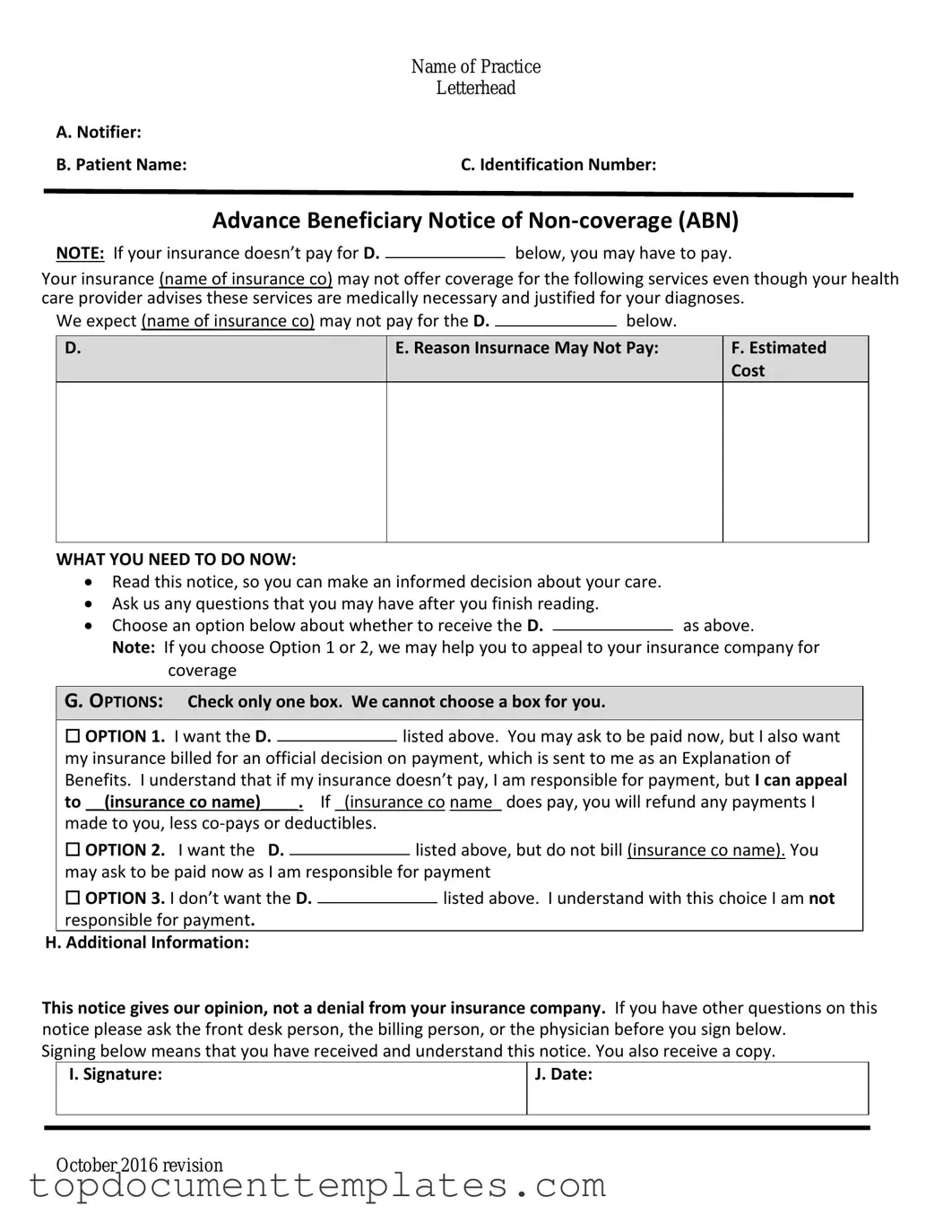Blank Advance Beneficiary Notice of Non-coverage PDF Form
The Advance Beneficiary Notice of Non-coverage (ABN) is a crucial document in the realm of healthcare services, designed to inform patients about their potential financial responsibilities when a service or item may not be covered by Medicare. This form plays a vital role in fostering transparency between healthcare providers and patients, ensuring that individuals are aware of the implications before receiving certain services. When a provider anticipates that Medicare might deny payment for a specific service, they must issue an ABN, allowing patients to make informed decisions about their care. The form outlines the reasons for the anticipated non-coverage, details the patient’s rights, and provides options for how to proceed, including whether to accept the service and pay out-of-pocket. Understanding the ABN is essential for patients to navigate their healthcare journey effectively, as it empowers them with knowledge about their coverage and potential costs, ultimately promoting better communication with their healthcare providers.
Similar forms
- Notice of Medicare Non-Coverage (NOMNC): This document informs beneficiaries that a service or item may not be covered by Medicare. Like the Advance Beneficiary Notice of Non-coverage, it provides essential information about potential costs and coverage decisions.
- Florida Power of Attorney form: This legal document grants an agent the authority to act on behalf of a principal in financial or health-related matters, making it essential for proper planning and decision-making, especially in unforeseen circumstances. More information can be found at OnlineLawDocs.com.
- Medicare Summary Notice (MSN): The MSN summarizes services received and explains what Medicare paid. It helps beneficiaries understand their financial responsibility, similar to how the Advance Beneficiary Notice outlines potential costs.
- Important Message from Medicare (IM) : This notice is given to patients upon admission to a hospital. It explains their rights under Medicare, much like the Advance Beneficiary Notice informs beneficiaries about coverage decisions.
- Patient Consent Form: This form is used to obtain a patient’s consent for treatment. While it serves a different purpose, both documents require clear communication about services and potential costs.
- Explanation of Benefits (EOB): An EOB outlines what services were billed to insurance and the patient’s share of costs. Similar to the Advance Beneficiary Notice, it details financial responsibilities related to healthcare services.
Guidelines on Writing Advance Beneficiary Notice of Non-coverage
After receiving the Advance Beneficiary Notice of Non-coverage form, you will need to complete it accurately to ensure that your understanding of potential non-coverage is clear. This form is important for documenting your acknowledgment of services that may not be covered by Medicare. Follow these steps to fill out the form correctly.
- Read the Form Carefully: Begin by reading the entire form to understand its purpose and the information required.
- Fill in Your Information: Enter your name, address, and Medicare number at the top of the form. Make sure the details are accurate.
- Service Information: Identify the service or item that is being discussed. Clearly describe what the service is and when it was provided.
- Reason for Non-coverage: Indicate the reason why you believe the service may not be covered. This could include factors like it being deemed unnecessary or not meeting Medicare guidelines.
- Sign and Date: At the bottom of the form, sign and date it to confirm that you understand the information provided and acknowledge the potential for non-coverage.
- Keep a Copy: Make a copy of the completed form for your records. This will help you keep track of any discussions or decisions related to your Medicare coverage.
Once you have filled out the form, it should be submitted to your healthcare provider. They will review the information and may discuss further steps with you. Ensure that you keep an open line of communication regarding your coverage options.
Form Data
| Fact Name | Description |
|---|---|
| Definition | The Advance Beneficiary Notice of Non-coverage (ABN) is a form used by healthcare providers to inform patients that Medicare may not cover a specific service or item. |
| Purpose | The primary purpose of the ABN is to ensure that patients are aware of potential costs before receiving services that Medicare might deny. |
| When to Use | Providers must issue an ABN when they believe that a service or item is not likely to be covered by Medicare. |
| Patient Rights | Patients have the right to refuse the service after being informed about potential non-coverage through the ABN. |
| State-Specific Forms | Some states may have specific requirements regarding the ABN, including additional disclosures. For example, California requires a specific ABN format under its state law. |
| Signature Requirement | Patients must sign the ABN to acknowledge that they understand the information provided and the potential financial responsibility. |
| Validity Period | The ABN is valid for a specific service or item and does not cover future services unless a new ABN is issued. |
| Provider Obligations | Healthcare providers are obligated to explain the ABN to patients, including the reasons for potential non-coverage. |
| Impact on Billing | If a patient receives a service after signing the ABN and Medicare denies coverage, the provider can bill the patient directly for the service. |
Other PDF Documents
Advance Salary Format - Utilize this form to formally ask your employer for a salary advance.
For those looking to establish clear rental terms, a comprehensive Room Rental Agreement form can be invaluable. This document not only outlines the responsibilities of both landlords and tenants but also aids in preventing misunderstandings, creating a stable living environment. To access the form, visit this resource for a Room Rental Agreement.
How to File a Lien in Florida - A lien could lead to serious legal ramifications; thus, prompt attention is essential.
Proof of Pregnancy Form Planned Parenthood California - Patient education is provided regarding the limitations and follow-up actions based on test results.
